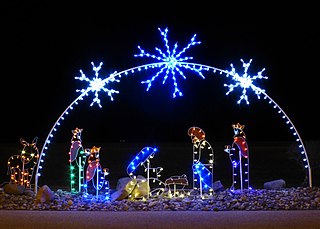
Christmas is an annual festival commemorating the birth of Jesus Christ, observed primarily on December 25 as a religious and cultural celebration among billions of people around the world. A feast central to the liturgical year in Christianity, it follows the season of Advent or the Nativity Fast, and initiates the season of Christmastide, which historically in the West lasts twelve days and culminates on Twelfth Night. Christmas Day is a public holiday in many countries, is celebrated religiously by a majority of Christians, as well as culturally by many non-Christians, and forms an integral part of the holiday season surrounding it.
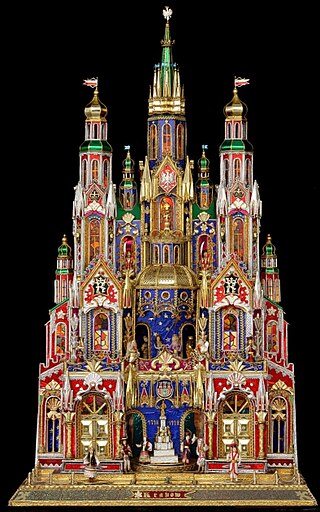
Christmas in Poland is a major annual celebration, as in most countries of the Christian world. The observance of Christmas developed gradually over the centuries, beginning in ancient times; combining old Polish pagan customs with the religious ones introduced after the Christianization of Poland by the Catholic Church. Later influences include the mutual permeating of local traditions and various folk cultures. It is one of the most important religious holidays for Poles, who follow a somewhat strict traditional custom. Christmas trees are decorated and lit in family rooms on the day of Christmas Eve. Other trees are placed in most public areas and outside churches. Christmas in Poland is called "Boże Narodzenie", which translates to 'God's Birth'.

Christmas Eve is the evening or entire day before Christmas Day, the festival commemorating the birth of Jesus. Christmas Day is observed around the world, and Christmas Eve is widely observed as a full or partial holiday in anticipation of Christmas Day. Together, both days are considered one of the most culturally significant celebrations in Christendom and Western society.
Kris Kringle may refer to:

Sinterklaas or Sint-Nicolaas is a legendary figure based on Saint Nicholas, patron saint of children. Other Dutch names for the figure include De Sint, De Goede Sint and De Goedheiligman. Many descendants and cognates of "Sinterklaas" or "Saint Nicholas" in other languages are also used in the Low Countries, nearby regions, and former Dutch colonies.
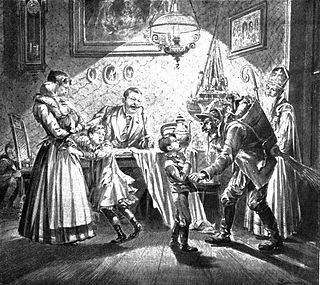
The companions of Saint Nicholas are a group of closely related figures who accompany Saint Nicholas throughout the territories formerly in the Holy Roman Empire or the countries that it influenced culturally. These characters act as a foil to the benevolent Christmas gift-bringer, threatening to thrash or abduct disobedient children. Jacob Grimm associated this character with the pre-Christian house spirit which could be benevolent or malicious, but whose mischievous side was emphasized after Christianization. The association of the Christmas gift-bringer with elves has parallels in English and Scandinavian folklore, and is ultimately and remotely connected to the Christmas elf in modern American folklore.

Saint Nicholas Day, also called the Feast of Saint Nicholas, observed on 5 or 6 December in Western Christian countries, and on 19 December in Eastern Christian countries using the old church Calendar, is the feast day of Saint Nicholas of Myra; it falls within the season of Advent. It is celebrated as a Christian festival with particular regard to Saint Nicholas' reputation as a bringer of gifts, as well as through the attendance of church services.
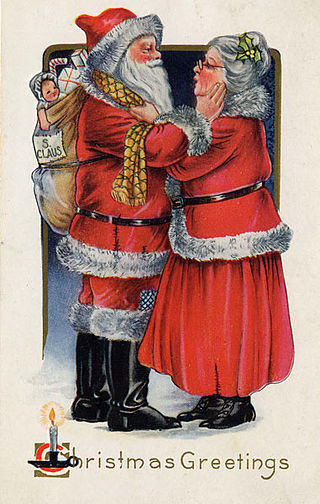
Mrs. Claus is the legendary wife of Santa Claus, the Christmas gift-bringer in Western Christmas tradition.

The observance of Christmas around the world varies by country. The day of Christmas, and in some cases the day before and the day after, are recognized by many national governments and cultures worldwide, including in areas where Christianity is a minority religion. In some non-Christian areas, periods of former colonial rule introduced the celebration ; in others, Christian minorities or foreign cultural influences have led populations to observe the holiday.

Ded Moroz or Morozko is a legendary figure similar to Saint Nicholas, Father Christmas, and Santa Claus who has his roots in Slavic mythology. The tradition of Ded Moroz is mostly spread in East Slavic countries and is a significant part of Russian culture. At the beginning of the Soviet era, communist authorities banned Ded Moroz. However, the ban was lifted and he soon became a significant part of Soviet culture. The literal translation of DedMoroz is Old Man Frost, but traditionally the name is translated as Father Frost.
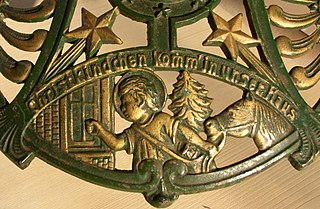
The Christkind, also called Christkindl, is the traditional Christmas gift-bringer in Austria, Switzerland, southern and western Germany, the Czech Republic, Croatia, Liechtenstein, Luxembourg, the eastern part of Belgium, Portugal, Slovakia, Hungary, parts of northeastern France, Upper Silesia in Poland, parts of Latin America, in certain areas of southern Brazil, and in the Acadiana region of Louisiana. Christkind is called in Portuguese Menino Jesus, in Hungarian Jézuska, in Slovak Ježiško, in Czech Ježíšek, in Latin America Niño Dios or Niño Jesús and in Croatian Isusić or Isusek, in Silesian Dziyciōntko Jezus, in Cieszyn Silesian Aniołek, in Polish Dzieciątko. In some parts of Italy, the analogous figure of the Christkind is known as Gesù Bambino.
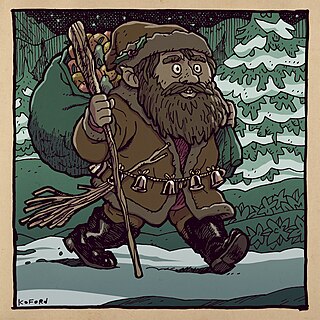
Knecht Ruprecht is a companion of Saint Nicholas as described in the folklore of Germany. He is the most popular gift-bringing character in Germany after Saint Nicholas, Christkindl, and Der Weihnachtsmann but is virtually unknown outside the country. He first appears in written sources in the 17th century, as a figure in a Nuremberg Christmas procession.
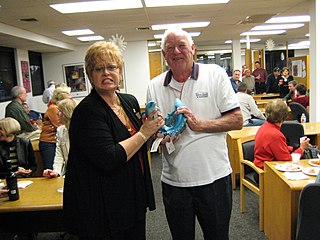
A white elephant gift exchange, Yankee swap or Dirty Santa is a party game where amusing and impractical gifts are exchanged during festivities. The goal of a white elephant gift exchange is to entertain party-goers rather than to gain a genuinely valuable or highly sought item.
"Christmas Party" is the tenth episode of the second season of the American comedy television series The Office and the show's sixteenth episode overall. It was written by Michael Schur and directed by Charles McDougall. It was first broadcast on December 6, 2005 on NBC. The episode guest stars David Koechner as Todd Packer.

Santa Claus Is Comin' to Town is a 1970 stop motion Christmas television special produced by Rankin/Bass Productions in New York, New York. The film is narrated by Fred Astaire and stars the voices of Mickey Rooney, Keenan Wynn, Robie Lester, Joan Gardner and Paul Frees, as well as an assistant song performance by the Westminster Children's Choir. The film tells the story of how Santa Claus and several Claus-related Christmas traditions came to be. It is based on the hit Christmas song, "Santa Claus Is Comin' to Town", which was written by J. Fred Coots and Haven Gillespie for Leo Feist, Inc. and introduced on radio by Eddie Cantor in 1934; and the story of Saint Nicholas.

Santa Claus, also known as Father Christmas, Saint Nicholas, Saint Nick, Kris Kringle, or simply Santa, is a legendary figure originating in Western Christian culture who is said to bring gifts during the late evening and overnight hours on Christmas Eve. He is said to accomplish this with the aid of Christmas elves, who make the toys in his North Pole workshop, and with the aid of flying reindeer who pull his sleigh through the air.
Elfster is a proprietary software application providing social networking features related to "secret Santa" style gift exchanges. It is available, without charge, as software as a service, via a website and via mobile apps for iOS and Android.
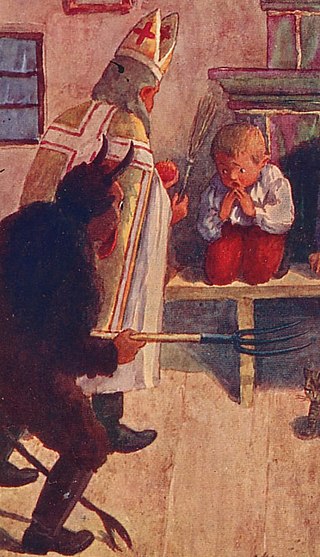
The Krampus is a horned anthropomorphic figure who, in the Central and Eastern Alpine folkloric tradition, is said to accompany Saint Nicholas on visits to children during the night of 5 December (Krampusnacht; “Krampus Night”), immediately before the Feast of St. Nicholas on 6 December. In this tradition, Saint Nicholas rewards well-behaved children with small gifts, while Krampus punishes badly-behaved ones with birch rods.

Noelle is a 2019 American Christmas fantasy comedy film written and directed by Marc Lawrence, produced by Walt Disney Pictures and distributed by Walt Disney Studios Motion Pictures. The film stars Anna Kendrick as Noelle Kringle, the daughter of Kris Kringle. It also stars Bill Hader, Kingsley Ben-Adir, Billy Eichner, Julie Hagerty, and Shirley MacLaine. In the film, when Noelle's brother Nick is stressed from all the pressure of taking over for their father, he leaves and does not return. She must find her brother and bring him back in time for Christmas. It was filmed from October 2017 to January 2018 in British Columbia and Woodstock, Georgia.

Christmas traditions include a variety of customs, religious practices, rituals, and folklore associated with the celebration of Christmas. Many of these traditions vary by country or region, while others are practiced virtually identically worldwide.
















